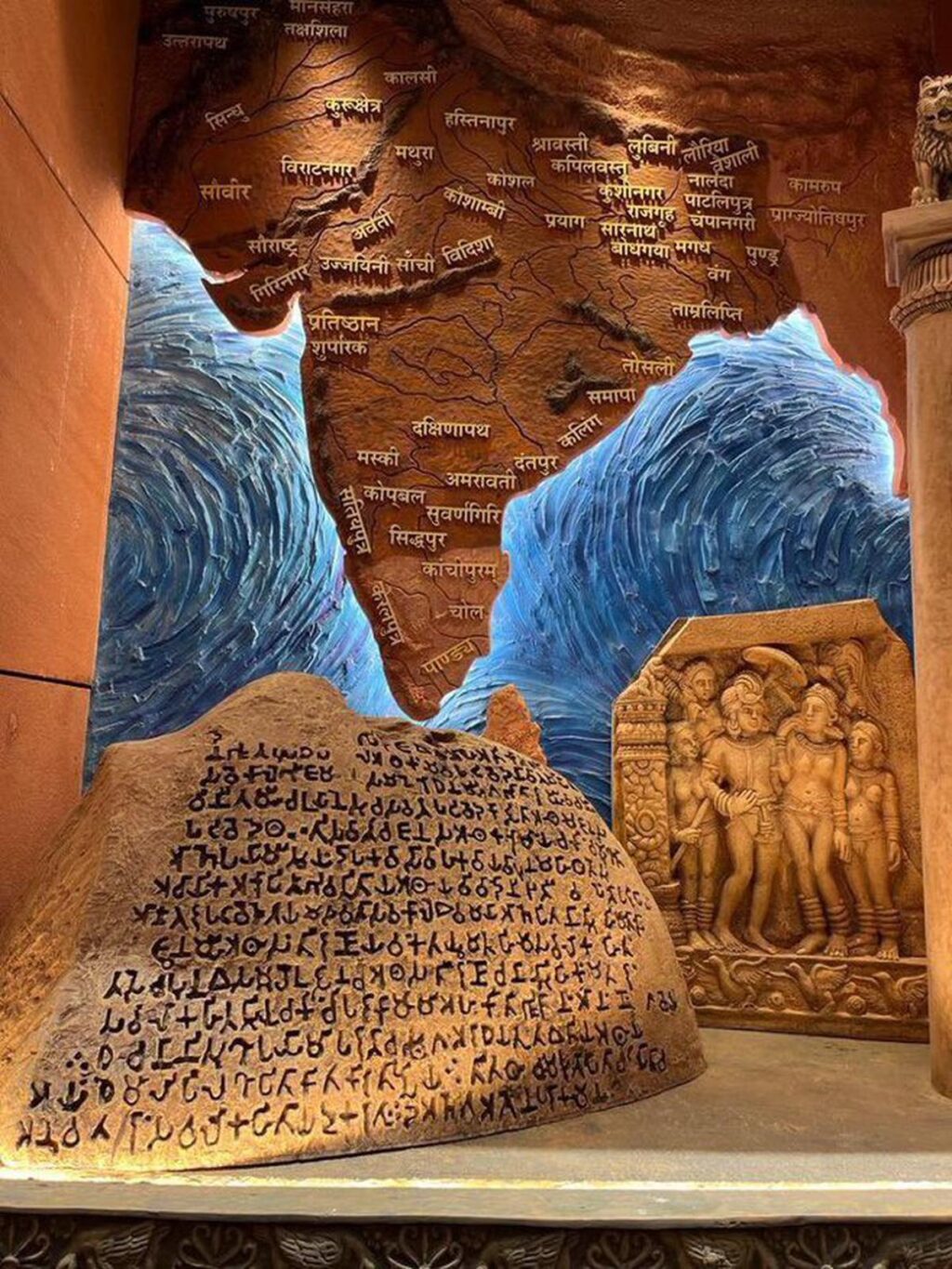Akhand Bharat Proves Religious Extremists Are After The Same Thing
Jun 2, 2023 | Shalini Rai
The mural of 'Akhand Bharat' in the new Parliament building. “Bharat” may look like a well-reasoned and uncontroversial replacement for a term anointed long ago by outsiders but its use has elicited outcry from the political opposition, some Muslims, and Hindu conservatives in the south, reflecting ongoing tensions in India between language, religion and politics (Image: Twitter)
We Indians pride ourselves on values such as ‘nationalism’ and ‘patriotism’. In certain cities, there are even public arenas built around bravery and celebrations of it. The ‘Shaurya Smarak’ in Bhopal is one such spot. People of this central capital Indian city of Madhya Pradesh state are encouraged to spend their weekly holidays at this spot. Feting of war heroes and patriots is a mega affair.
In effect, a large number of Indians are proud of putting their nation first and expect nothing less than celebratory acknowledgement of it.
This is in contrast to the way we view our belligerent neighbour, which is religiously castigated in a variety of fora for putting its religion first and above all other criteria that bring that nation together. TV channels in our country bray about what a failure Pakistan is and how its collapse is a matter of ‘when’, not ‘if’. The two-nation theory, which formed the basis of the birth of Pakistan, comes in for special criticism and mockery in Indian TV coverage. The act of allegiance to a particular religion, practised by millions of people across the world, is given huge traction in some prime-time programmes. From Turkey to Egypt and from Iran to Indonesia, the global Islamic brotherhood is shown to rise above boundaries of language and political affiliations.
It is also this fact that is held against a particular religion, which is in a minority in India at present. The argument presented is forceful and strong enough to convince many.
The right-wing nationalists currently active in India present a picture of an India in which nation comes first and all else, including religion, later. They argue, invoking fire and brimstone-esque arguments that those who put their religion before their nation deserve a special kind of denunciation. They preach from, what one can only assume, is a moral high ground that is so high as if to give vertigo to mere mortals, about the nefarious tendency of putting religion first.
Yet they forget that the alternative they are presenting, to Indians in general and Hindus in particular, is just another, sanitised, saffronised version of the principle that makes Islamists and their ideological convictions so much of an anathema to them. There is a delicious irony in this postulation by the saffron brigade. When they present the map of ‘Akhand Bharat’ (undivided India), it incorporates the concept of a unified Greater India and asserts that modern-day Afghanistan, Bangladesh, Bhutan, India, Maldives, Myanmar, Nepal, Pakistan, and Sri Lanka are one nation.
At the recent inauguration of the new Parliament building, this mural of ‘Akhand Bharat’ was prominently showcased and several social media accounts went into overdrive expounding the virtues of an undivided India, which they claimed is soon to become a reality. The call for the realisation of an ‘Akhand Bharat’ has been a favourite demand of Hindu nationalist organisations such as the Hindu Mahasabha, RSS, VHP, Shiv Sena, Hindu Sena, Hindu Janajagruti Samiti and others for decades.
One such organisation — the Akhand Hindustan Morcha — carries the term in its very nomenclature. In pre-1947 maps of India, one can see Pakistan and Bangladesh as part of British India. The creation of an Akhand Bharat is ideologically linked with the concept of ‘Hindutva’ and the ideas of shuddhi (purification) and sangathan (unity).
What they don’t want to reveal cogently or even, openly, is that what links all the erstwhile constitutents of Akhand Bharat is (in large part) Hindutva, Hindu religion, language and cultural mores.
A chapter in the RSS textbook for Class VII students at the Akhil Bharatiya Sanskrit Gyan Pariksha included a map depicting pre-Partition Bangladesh and Pakistan as territories of Akhand Bharat. A trade union magazine of the RSS also included Bhutan, Myanmar and Nepal as part of undivided India.
Although the BJP leadership wavers on adopting a concrete ideological stance on this issue, the RSS has always been a strong proponent of this idea. Organiser magazine, affiliated to the RSS, often carries editorials espousing the philosophy that only Akhand Bharat can bring real, lasting, tangible freedom to the people of India.
It is pertinent to remember (as mentioned above) that in all this, the common thread that brings the nationalist tapestry together is the perceived presence of Hindutva, Hindu religion, language and cultural mores.
If viewed in this light, there is not much difference between the proponents of a united Islamic nation-state spanning countries and continents and the more subdued but nevertheless similar, assertions towards the establishment of an Akhand Bharat united by shared religious, cultural and linguistic traditions spread across several present day nation-states.
In other words, the two extreme religious ideologies prove that they are quite similar in desiring a proto-Indian political entity based on and united by (perceived to be) common, similar, relatable social conventions.
